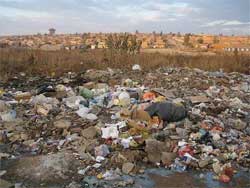
The General Manager for Chemicals, Mechanicals and Materials at the NRCS, Thomas Madzivhe, said those found in possession of plastic bags that do not meet the requirements of the revised compulsory specifications will have to hand them over to the NRCS to be destroyed.
Madzivhe said plastic bags that are thinner than 24 microns do not meet the requirements and are impossible to recycle.
"Everyone must just comply with the regulations. This is compulsory and there will be no more negotiations. Those who manufacture bags that do not meet the specifications will be charged," he said.
The revised compulsory specifications came into effect on 23 October. They were approved by Trade and Industry Minister Rob Davies in September last year.
The revised compulsory specifications cover the thickness and printing of the bags, but exclude bread bags, refuse bags, bin liners, household plastic bags and primary packaging.
Madzivhe said manufacturers, distributors and retailers who make bags that do not meet the regulations will be charged, and he court will decide on their conviction and sentence that may include imprisonment.
Since the regulations were applied, in Gauteng alone, over one billion plastic bags that did not meet the requirements have been confiscated from three retailers. The bags will be destroyed.

The NCRS launched a national campaign to inspect factories making plastic carrier bags to ensure compliance with the latest compulsory specifications.
The Operational Manager at the NRCS, Rhoda Mbukwane, said an intense inspection will last for a week in the province and will be rolled out to other provinces thereafter.
"There will be inspectors in all the nine provinces, who will continue with regular inspections," said Mbukwane.
The implementation of the revised compulsory specifications for plastic carrier bags and flat bags is aimed at reducing plastic litter in the environment and promoting the reuse and recycling of plastic bags. It was first promulgated in 2003 in conjunction with the then Department of Environmental Affairs and Tourism.
Madzivhe said people recognise that there is value in collecting plastics bags and selling them, which has a positive impact on the country's environment and economy.
He said any plastic bag that is not in line with regulatory requirements should not be sold on the market. Manufacturers must get approval from the NRCS so they can get the NRCS mark on each plastic bag.
He said all retailers pay a levy for plastic bags and the South African Revenue Service (SARS) deducts six cents for each plastic bag sold.
However, Madzivhe could not say whether the regulatory requirements will affect buyers or not, as the retailers decided on pricing.
SAnews.gov.za is a South African government news service, published by the Government Communication and Information System (GCIS). SAnews.gov.za (formerly BuaNews) was established to provide quick and easy access to articles and feature stories aimed at keeping the public informed about the implementation of government mandates.
Go to: http://www.sanews.gov.za